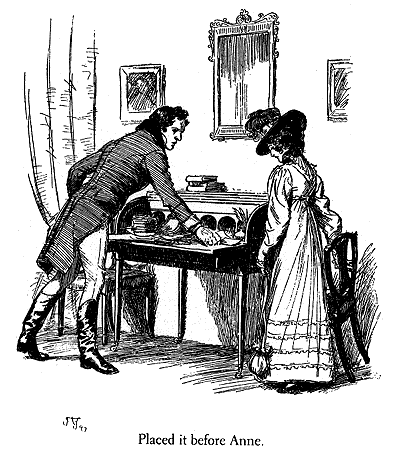Jane Austen tells us of Anne Elliot, the heroine of Persuasion, that she "had been forced into prudence in her youth, she learned romance as she got older." Anne is tested as no other JA heroine is tested. In most cases the heroine learns about virtue along the way and gets her man relatively quickly, but not Anne. Anne must wait eight and a half years. Emsley convincingly argues that it is "Firmness, specifically firmness in resisting persuasion, is a central concern for Austen in this novel. When is firmness a good thing, and how is firmness related to strength, fortitude, and hope?...this novel provides further clues to Austen's Aristotelian and Christian view of virtue, which can help to illuminate the other novels and explain how Austen sees the virtues in harmony as well as tension with one another." Emsley goes on to point out that for JA "ethics has to do with character rather than rules," citing the example of Anne confiding to Wentworth, at the end of the novel, that she was right in taking Lady Russell's advice, even though it was the wrong advice. Anne tells him, "I was right in submitting to her, and that if I had done otherwise...I should have suffered in my conscience."
Emsley states, "Austen's reference to the proportions and limits on desirable qualities recalls Aristotle's doctrine of the mean, in which virtuous qualities have proportions and limits. Though Wentworth himself does not realize it, he does think that to be sometimes persuadable is a good thing...Perhaps one of the reasons he dislikes the idea of persuasion is that in the situation where it most mattered to him, he failed to persuade Anne to marry him..." Wentworth now begins to value Anne's strength of mind, asking for her opinion on how best to break the news to Louisa's parents. When recalling the accident, he confesses to Anne, "She would not have been obstinate, if I had not been weak." Wentworth is beginning to review his own character. Coming to the self-realization that it was his weakness of pride that has cost them years of happiness, "I was proud, too proud to ask again." Perhaps now he is also reassessing his swift judgment of Anne that he made all those years ago. Emsley writes, "Thus Wentworth has come to question firmness, and in doing so has learned something of Anne's Aristotelianism, as well as of her Stoic fortitude and Christian patience and humility." Austen tells us, "he had learnt to distinguish between the steadiness of principle and the obstinacy of self-will, between the daring of heedlessness and the resolution of a collected mind...[Anne's] character was now fixed on his mind as perfection itself, maintaining the loveliest medium of fortitude and gentleness."

Emsley argues that, "For Anne, the primary virtue is hope." Anne keeps her spirits up, takes joy in being useful to her family and the Musgroves. She does avoid a false hope, or expectation, but does not wait for happiness to find her. Anne could apply the description of her friend, Mrs Smith, to herself when she observes, "A submissive spirit might be patient, a strong understanding would supply resolution, but here was something more, here was that elasticity of mind, that disposition to be comforted, that power of turning readily from evil to good, and of finding employment which carried her out of herself, which was from nature alone." Austen's use of the phrase "elasticity of mind" shows that the virtue of hope is not stagnate, but must be exercised and used.
It is not only Wentworth who must discern the balance of the virtues in himself and others. Anne, on meeting her cousin Mr Elliot, observes his character. She does not approve of what she remembers of his character, but leaves open the possibility that he has changed. She cannot put her finger on it right away, but realizes that, "There was never any burst of feeling, any warmth of indignation or delight, at the evil or good of others." What Anne at first thinks is Mr Elliot only being "too generally agreeable," she later realizes, through Mrs Smith's enlightenment, is a true and great character flaw.

Anne is constant, and, as Emsley says, "Constancy is closely related to faith...[Anne] is loving, hopeful, and faithful. Persuasion raises the problem of firmness and then shows that elasticity and flexibility are more important to the practice of virtue than is firm adherence to rules...Persuasion is in fact Austen's clearest articulation of her interest in both classical and Christian virtues...If she had lived to revise this novel, perhaps she would have made the references to virtue more subtle, as they are in other novels, but as it is in Persuasion...[it] contains the closest thing to an explicit theory of the unity of classical and Christian virtues."
These thoughts are taken from the seventh chapter (entitled, Balancing the Virtues in Persuasion) of Sarah Baxter Emsley's book, Jane Austen's Philosophy of the Virtues
1 comment:
I think the 1995 movie did a great job with this book, but it cannot portray all of Anne's thought patterns and patience as well as depth. She is the older heroine, yes, but for good reason, to make her stronger. If it had been me JA was writing about waiting for my man, I'm not so sure this description would have applied, "A submissive spirit might be patient, a strong understanding would supply resolution, but here was something more, here was that elasticity of mind, that disposition to be comforted, that power of turning readily from evil to good, and of finding employment which carried her out of herself, which was from nature alone."
So very good of her to portray it for us in a character so lovely as Anne.
Post a Comment